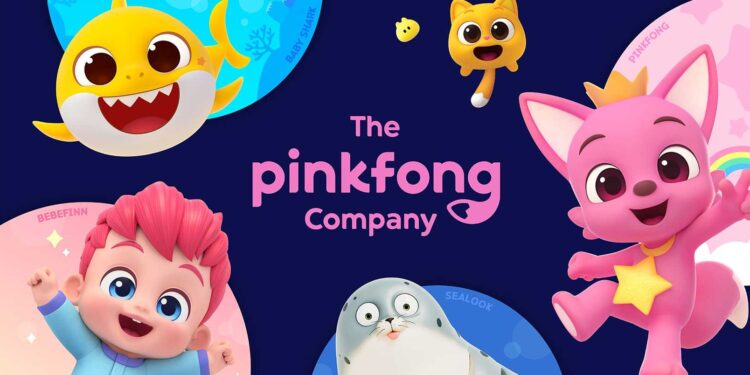The Pinkfong Company, the Korean entertainment firm behind the global children’s phenomenon Baby Shark, is quietly exploring a potential sale of its management rights.
Despite recently applying for a preliminary KOSDAQ listing review in May 2025, Pinkfong appears to be prioritizing a controlling stake transfer through bundled shares from top shareholders, according to exclusive reports from the M&A industry. Multiple sources confirm that Pinkfong is currently in confidential negotiations with potential buyers, with a multibillion-won price tag under negotiation.
The company’s most valuable asset is its intellectual property (IP) portfolio, led by the Baby Shark brand, which has emerged as a widely recognized part of Korea’s cultural export strategy in children’s content.
Major Shareholders and Deal Structure
As of Q1 2025, Pinkfong’s major shareholders include:
- CEO Kim Min-seok: 18.44%
- Samsung Publishing (controlled by Kim’s father): 16.77%
- KT Corporation: 9.17%
The current sale plan reportedly includes a transfer of management rights through bundled shares from these top stakeholders. While The Pinkfong Company has previously attracted acquisition interest from private equity (PE) firms, earlier talks have not resulted in a finalized transaction.
Insiders suggest that the company is now engaging more seriously, driven by a shifting outlook in Korea’s capital markets and cooling IPO sentiment for IP-heavy media companies.
IPO Filing Still Active, But Secondary
Previously, The Pinkfong Company filed for preliminary IPO review with the Korea Exchange. However, the latest developments suggest that the firm is running a dual-track process, where a sale of management control may take precedence over public listing.
If M&A negotiations stall or fail to reach consensus, the IPO path remains viable. After all, Pinkfong’s financials show solid fundamentals: in 2024, the company reported ₩97.3 billion in revenue (approx. $74.8 million USD) and ₩18.8 billion in operating profit (approx. $14.5 million USD), making it one of Korea’s more profitable IP-led content firms.
From Viral Song to Global IP Empire
Founded in 2010 as a Korean startup under the name SmartStudy as a Samsung Publishing subsidiary, the company rebranded as The Pinkfong Company to align with its breakout IP success. CEO Kim Min Seok, son of Samsung Publishing CEO Kim Jin Yong, led the firm’s evolution from digital learning content to full-fledged multimedia exports.
Pinkfong has produced and distributed animation, music, and films across 244 countries and regions worldwide in 25 languages as of March 2025. Its YouTube metrics are staggering:
- 140 billion cumulative views
- 240 million cumulative subscribers
Its flagship brands—Pinkfong, Baby Shark, and Bebefinn—have generated extensive revenue streams through licensing deals, including toys, apparel, and merchandising collaborations.
The Baby Shark franchise alone has become a global cultural artifact. First uploaded to YouTube in November 2015, the Korean version quickly gained traction, followed by an English-language “Baby Shark Dance” version in 2016 that went viral.
The brand has since evolved into a multi-format business including TV, cinema, and digital-native franchises.
Expansion in Japan and B2B Services
To maintain momentum, The Pinkfong Company has recently intensified global expansion.
In early 2025, it launched its fifth overseas branch in Japan. In parallel, it has begun commercializing its expertise in YouTube channel operations by offering B2B consulting, advertising services, and branded channel management for corporate clients.
This diversification could increase its valuation in the eyes of both strategic and financial buyers, positioning Pinkfong as more than just an IP studio but also a scalable content operations company with recurring digital infrastructure capabilities.
Implications for Korea’s K-Content Export Playbook
Finally, Pinkfong’s potential sell-off comes at a moment of reflection for Korea’s broader K-content industry.
While K-dramas and K-pop dominate global headlines, Baby Shark remains one of Korea’s most recognized cultural exports, especially in family entertainment.
The strategic choice to explore M&A over IPO signals an important shift: Korean content firms may begin favoring faster liquidity and private expansion partnerships over prolonged public market exposure, particularly as domestic IPO valuations cool and global IP saturation rises.
If completed, the deal could offer a reference point for how Korean IP-driven content firms are restructuring for global scalability, and how Korea continues to evolve its soft power strategy in the wake of the country’s post-streaming export recalibration.
Stay informed on Korea’s fast-moving startup and tech scene—follow KoreaTechDesk on social media: LinkedIn, X (Twitter), Bluesky, and Facebook for insights, funding news, and industry updates.










